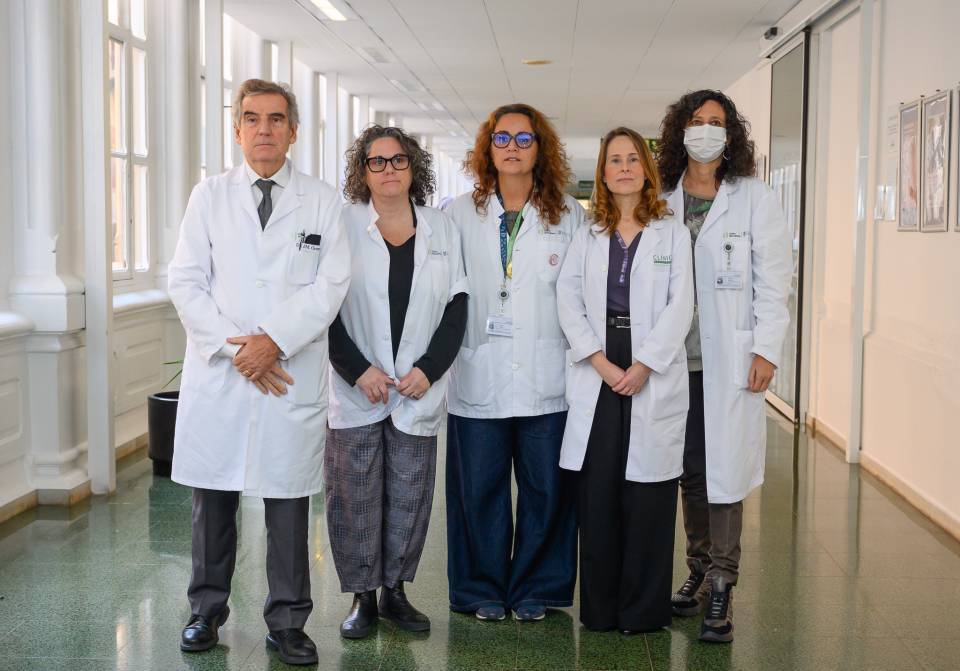Organization - Gynecology Service
Physical Areas of the Gynaecology Department:
The Gynaecology Department has five physical areas in which the medical activity of the functional areas is carried out. The physical areas are as follows:
- Outpatient department: located on the 3rd floor of the outpatient clinic building (Rosselló wing) with 15 consultation rooms.
- Assisted Reproduction and Andrology Laboratory: located on the 1st floor of the outpatient clinic building, which includes the embryology, andrology and cryobiology laboratories.
- Hospitalization ward: located in G053 (staircase 5, 3rd floor) with 16 beds, a doctors’ room, patient manager's office, and 2 offices for nursing supervisors.
- Gynaecological diagnosis and treatment room: located on staircase 5, 2nd floor, where there are 3 rooms that can be used for carrying out minor outpatient surgery (room for diagnosis and surgical hysteroscopy, room for cone biopsies and other treatments of the anogenital tract and a urodynamics room where diagnostic procedures and rehabilitation of the pelvic floor are preformed), post-surgery recovery room, 2 high-resolution gynaecological ultrasound rooms, and 1 room for doctors and administrative staff.
- 2 conventional surgery operating theatres (numbers 7 and 8) in the Hospital’s surgical block, 1 intraoperative radiotherapy operating theatre located on floor 0, between staircases 9 and 11 (IOR) and 2 major outpatient surgery (MOS) or short-stay operating theatres (numbers 4 and 5) in the major outpatient surgery block located on staircase 4, 1st floor.
Functional Areas of the Gynaecology Department:
The healthcare activity is currently carried out in 3 main functional areas:
1.- GENERAL GYNAECOLOGY Area: includes the diagnosis and treatment of benign gynaecological pathology (endometriosis, uterine and ovarian pathology, chronic pelvic pain, gender identity disorders, sexual dysfunctions and genitourinary malformations, pelvic floor pathology, menopause, and gynaecological endocrinology). This area uses the gynaecological diagnosis and treatment room located in 5.2, the outpatient clinic block, the hospitalization ward, and the operating theatres, both those of the block and the MOS.
2.- ASSISTED HUMAN REPRODUCTION Section: fertility problems (infertility or recurrent pregnancy loss) are studied and treated. The aim of the reproduction team is to provide highly specialized and multidisciplinary care, so that patients can achieve pregnancy and fulfil their family planning goals. The Head of Department is Dr Dolors Manau and she coordinates the reproduction team made up of gynaecologists, biologists, nurses, laboratory technicians and psychologists, who work together with other specialists such as urologists, geneticists, oncologists, haemostasis specialists, and also with specialists in maternal-foetal medicine, who monitor pregnancies carried to term.
It has special programmes such as:
- Fertility preservation, in patients who have to undergo potentially gonadotoxic treatments such as chemotherapy/ radiotherapy or repeated ovarian surgeries (endometriosis, dermoid cysts, etc.) as well as situations involving the risk of ovarian failure such as genetic disorders (Turner syndrome, permutations of the FMR1 gene, etc.) among others.
- Ovarian cortex cryopreservation programme. Being a reference centre for this experimental fertility preservation technique
- Gamete donation programme (oocytes and semen)
- Transgender care programme
Patient care activities take place in the outpatient clinic building and the In Vitro Fertilization Laboratory. In addition, surgical interventions are mainly carried out in the MOS.
3- ONCOLOGICAL GYNAECOLOGY Unit: established as a multidisciplinary unit for the diagnosis and treatment of gynaecological oncological pathology, lower genital tract pathology and colposcopy and mammary pathology. The patient care activity is carried out in the outpatient clinic block, operating theatres in that block and the IOR and the 5.2 room where minor anogenital tract surgeries are performed. The Head of Unit is Dr Aureli Torné, who also coordinates the hospital's transversal gynaecological oncology unit, which includes professionals from different specialities (gynaecological oncologists, medical oncologists, radiation oncologists, radiotherapists, radiologists, nuclear medicine doctors, gynaecopathologists, geneticists and advanced practice nurses).
In addition, there are two gynaecological diagnosis and treatment facilities: gynaecological ultrasound and hysteroscopy, which are structured as transversal areas within the same gynaecology department and provide care to patients from the three functional areas.
ICGON’s Gynaecology Department also works in coordination with other departments and healthcare areas:
- Breast Cancer Unit
- Oncological Gynaecology Unit
- Carcinomatosis Unit
- Genetics and Hereditary Cancer
- Rare Diseases
- Pulmonary Hypertension
- Digestive Surgery Department
- Urology Department
- Plastic Surgery Department
- Haemato-oncology Department
- Anaesthesia
- Anatomical Pathology
- Haemostasis and Haemotherapy
- Biochemistry and Molecular Genetics Department
In parallel, it participates in the following working groups:
- Obesity Functional Unit
- Sexology Group
- Fertility Preservation
- Carinomatosis Surgery
- Multimodal Pre-surgical Prehabilitation
- Preventive Medicine and Vaccinology
-
Gynaecological Oncology
The Unit is also responsible for the diagnosis and treatment of breast disease. It provides healthcare of the highest level and efficiency and includes most of the diagnostic and therapeutic procedures currently available, aimed at meeting the needs of women with gynecological neoplasms. The functional structure of the Unit is patient-centered, integrating professionals from different specialties with the goal of providing the best possible care. At the same time, the Unit’s objective is to be a benchmark in teaching and research.


